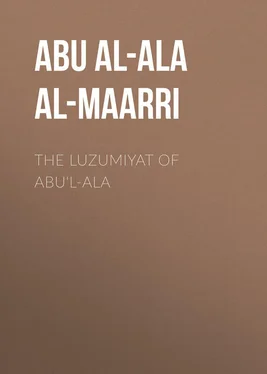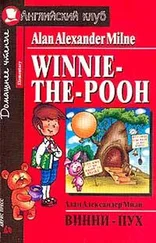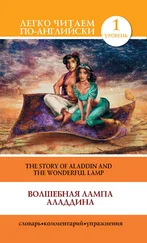Abu al-Ala al-Maarri - The Luzumiyat of Abu'l-Ala
Здесь есть возможность читать онлайн «Abu al-Ala al-Maarri - The Luzumiyat of Abu'l-Ala» — ознакомительный отрывок электронной книги совершенно бесплатно, а после прочтения отрывка купить полную версию. В некоторых случаях можно слушать аудио, скачать через торрент в формате fb2 и присутствует краткое содержание. Издательство: Иностранный паблик, Жанр: foreign_language, foreign_antique, foreign_prose, на английском языке. Описание произведения, (предисловие) а так же отзывы посетителей доступны на портале библиотеки ЛибКат.
- Название:The Luzumiyat of Abu'l-Ala
- Автор:
- Издательство:Иностранный паблик
- Жанр:
- Год:неизвестен
- ISBN:нет данных
- Рейтинг книги:5 / 5. Голосов: 1
-
Избранное:Добавить в избранное
- Отзывы:
-
Ваша оценка:
- 100
- 1
- 2
- 3
- 4
- 5
The Luzumiyat of Abu'l-Ala: краткое содержание, описание и аннотация
Предлагаем к чтению аннотацию, описание, краткое содержание или предисловие (зависит от того, что написал сам автор книги «The Luzumiyat of Abu'l-Ala»). Если вы не нашли необходимую информацию о книге — напишите в комментариях, мы постараемся отыскать её.
The Luzumiyat of Abu'l-Ala — читать онлайн ознакомительный отрывок
Ниже представлен текст книги, разбитый по страницам. Система сохранения места последней прочитанной страницы, позволяет с удобством читать онлайн бесплатно книгу «The Luzumiyat of Abu'l-Ala», без необходимости каждый раз заново искать на чём Вы остановились. Поставьте закладку, и сможете в любой момент перейти на страницу, на которой закончили чтение.
Интервал:
Закладка:
Ibn-Khillikan, The Plutarch of Arabia, who is cautious and guarded in his statements, speaking of Abu’l-Ala, truly says:
“His asceticism, his deep sense of right and wrong, his powerful intellect, his prodigious memory, and his wide range of learning, are alike acknowledged by both friend and foe.”
His pessimism was natural, in part hereditary. The man was nothing if not genuine and sincere. Ruthlessly he said what he thought and felt. He had no secrets to hide from the world, no thoughts which he dared not express. His soul was as open as Nature; his mind was the polished mirror of his age. 15 15 “His poems, generally known as the Luzumiyat, arrest attention by their boldness and originality as well as by the sombre and earnest tone which pervades them.” – Raynold A. Nicholson: A Literary History of the Arabs.
It may be that had he not been blind-stricken and had not small-pox disfigured his features, he might have found a palliative in human society. His pessimism might not have been cured, but it might have been rendered at least enticing. Good-fellowship might have robbed it of its sting. Nor is his strong aversion to marriage, in view of these facts, surprising.
He lived to know that “his fame spread from the sequestered village of Ma’arrah to the utmost confines of the Arabic speaking world.” In the spring of 1055 A.D. he died, and was buried in a garden surrounding his home. Adh-Dhahabi states that there were present at his grave eighty poets, and that the Koran was read there two hundred times in a fortnight. Eighty poets in the small town of Ma’arrah sounds incredible. But we must bear in mind that almost every one who studies the Arabic grammar has also to study prosody and versification and thus become at least a rhymster. Even to-day, the death of a noted person among the Arabs, is always an occasion for the display of much eloquence and tears, both in prose and verse.
Abu’l-Ala, beside being a poet and scholar of the first rank, was also one of the foremost thinkers of his age. Very little is said of his teachings, his characteristics, his many-sided intellect, in the biographies I have read. The fact that he was a liberal thinker, a trenchant writer, – free, candid, downright, independent, skeptical withal, – answers for the neglect on the part of Mohammedan doctors, who, when they do discuss him, try to conceal from the world what his poems unquestionably reveal. I am speaking, of course, of the neglect after his death. For during his life-time he was much honored, as I have shown, and many distinguished travellers came especially to Ma’arrah to see him. He was also often called upon to act as intercessor with the Emirs for the natives of his village. 16 16 The Governor of Halab, Salih ibn Mirdas, passed once by Ma’arrah, when thirty of its distinguished citizens were imprisoned on account of a riot in the town the previous year. Abu’l-Ala being asked to intercede for them, was led to Salih, who received him most politely and asked him what he desired. The poet, in eloquent but unflattering speech, asked Salih ‘to take and give forgiveness.’ And the Governor, not displeased, replied: ‘I grant it you.’ Whereupon the prisoners were released.
The larger collection of his poems, the Luzumiyat, 17 17 “His poems leave no aspect of the age (in which he lived) untouched, and present a vivid picture of degeneracy and corruption, in which tyrannous rulers, venal judges, hypocritical and unscrupulous theologians, swindling astrologers, roving swarms of dervishes and godless Carmathians, occupy a prominent place.” – Raynold A. Nicholson: A Literary History of the Arabs.
was published in Cairo, in two volumes, by Azeez Zind, from an original Ms. written in the twelfth century, under Abu’l-Ala’s own title Luzum ma la Yalzam , or the Necessity of what is Unnecessary. This title refers to the special system of rhyming which the poet adopted. And the poems, published in desultory fashion, were written, it seems, at different periods of his life, and are arranged according to his particular alphabetical system of rhyming. They bear no titles except, “And he also says, rhyming with so and so,” whatever the consonant and vowel may be. In his Preface to the Luzumiyat he says:
“It happened that I composed these poems during the past years, and in them I have always aimed at the truth. They are certainly free from the blandishments of exaggeration. And while some of them are written in glorification of God, who is above such glory, others are, as it were, a reminder to those who forget, a pinch to those who sleep, and a warning to the children of the earth against the wiles of the great world, where human rights and human gratitude are often strangled by the same hand of Fate.”
As for the translation of these chosen quatrains, let me say at the outset that it is almost impossible to adhere to the letter thereof and convey the meaning without being insipid, dull, and at times even ridiculous. There being no affinity between the Arabic and the English, their standards of art and beauty widely differ, and in the process of transformation the outer garment at times must necessarily be doffed. I have always adhered to the spirit, however, preserving the native imagery where it was not too clannish or grotesque. I have added nothing that was foreign to the ruling idea, nor have I omitted anything that was necessary to the completion of the general thought. One might get an idea of what is called a scholarly translation from the works of any of the Orientalists who have made a study of Abu’l-Ala. The first English scholar to mention the poet, as far as I know, was J. D. Carlisle, who in his “Specimens of Arabic Poetry”, published in 1810, has paraphrased in verse a quatrain on Pride and Virtue. He also translated into Latin one of Abu’l-Ala’s bold epigrams, fearing, I suppose, to publish it at that time in English.
The quatrains which are here published are culled from the three Volumes of his poems, and they are arranged, as nearly as may be, in the logical order of their sequence of thought. They form a kind of eclogue, which the poet-philosopher delivers from his prison in Ma’arrah.
Once, in Damascus, I visited, with some friends, a distinguished Sufi; and when the tea was being served, our host held forth on the subject of Abu’l-Ala’s creed. He quoted from the Luzumiyat to show that the poet-philosopher of Ma’arrah was a true Sufi, and of the highest order. “In his passionate hatred of the vile world and all the vile material manifestations of life,” quoth our host, “he was like a dervish dancing in sheer bewilderment; a holy man, indeed, melting in tears before the distorted image of Divinity. In his aloofness, as in the purity of his spirit, the ecstatic negations of Abu’l-Ala can only be translated in terms of the Sufi’s creed. In his raptures, shathat , he was as distant as Ibn ul-Arabi; and in his bewilderment, heirat
Конец ознакомительного фрагмента.
Текст предоставлен ООО «ЛитРес».
Прочитайте эту книгу целиком, купив полную легальную версию на ЛитРес.
Безопасно оплатить книгу можно банковской картой Visa, MasterCard, Maestro, со счета мобильного телефона, с платежного терминала, в салоне МТС или Связной, через PayPal, WebMoney, Яндекс.Деньги, QIWI Кошелек, бонусными картами или другим удобным Вам способом.
Читать дальшеИнтервал:
Закладка:
Похожие книги на «The Luzumiyat of Abu'l-Ala»
Представляем Вашему вниманию похожие книги на «The Luzumiyat of Abu'l-Ala» списком для выбора. Мы отобрали схожую по названию и смыслу литературу в надежде предоставить читателям больше вариантов отыскать новые, интересные, ещё непрочитанные произведения.
Обсуждение, отзывы о книге «The Luzumiyat of Abu'l-Ala» и просто собственные мнения читателей. Оставьте ваши комментарии, напишите, что Вы думаете о произведении, его смысле или главных героях. Укажите что конкретно понравилось, а что нет, и почему Вы так считаете.












